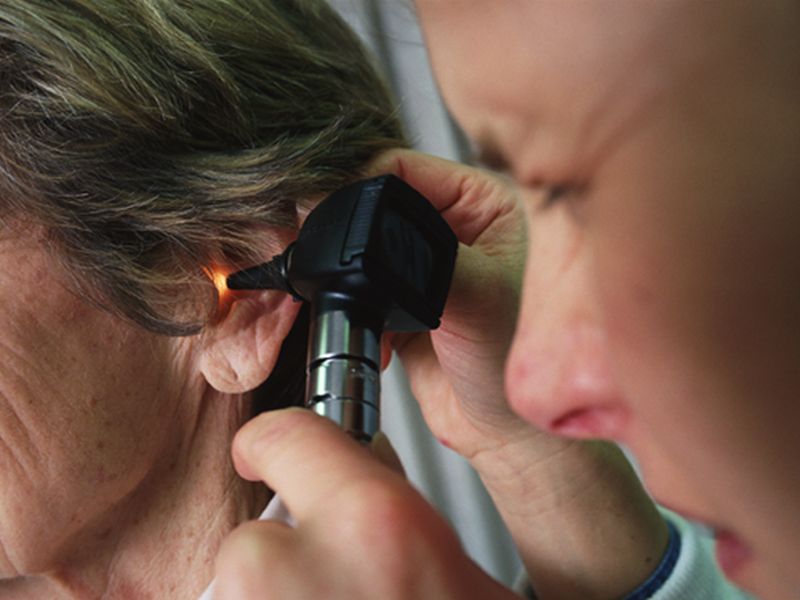
Thursday, March 2, 2017

THURSDAY, March 2, 2017 (HealthDay News) -- As the U.S. population ages, millions more will face the prospect of losing their hearing, researchers report.
Among American adults 20 and older, hearing loss is expected to increase from 44 million in 2020 (15 percent of adults) to 73.5 million by 2060 (23 percent of adults).
The increase will be greatest among older adults, according to the researchers from Johns Hopkins Medicine in Baltimore. In 2020, 55 percent of all adults with hearing loss will be 70 or older. In 2060, that rate will jump to 67 percent.
"In the coming decades, there will be an increased need for affordable interventions and access to hearing health care services," said lead study author Adele Goman. She's a research fellow at Hopkins' Center on Aging and Health.
Goman and her colleagues projected future hearing loss using data from the U.S. National Health and Nutrition Examination Survey.
"Hearing loss is a major public health issue that will affect many more adults," she said. "In order to address this issue, novel and cost-effective approaches to hearing health care are needed."
Neil DiSarno is chief staff officer of audiology at the American Speech-Language-Hearing Association. "This study projects unprecedented growth in this chronic health condition," he said.
As with all aspects of health care, professional hearing care is costly, he said.
"In order to provide appropriate treatment to those now experiencing the effects of hearing impairment, an effort must be undertaken to ensure the establishment of both public and private insurance coverage," DiSarno said.
Beyond cost, hearing loss takes a toll on an individual's quality of life and ability to communicate, work and engage in social and family activities, according to another hearing specialist.
"Hearing loss has been associated with a decrease in mental ability; this reminds us of the need for provision of hearing care for our population. Its importance will continue to increase," said Dr. Ian Storper. He's director of otology at the Center for Hearing and Balance Disorders at the New York Head and Neck Institute at Lenox Hill Hospital in New York City.
Dr. Debara Tucci, a spokesperson for the American Academy of Otolaryngology, Head and Neck Surgery, said that people aren't doomed to lose their hearing as they age.
The most common cause of hearing loss is prolonged exposure to loud noise, she said. This includes loud music and a noisy workplace.
"Care should be taken to limit the volume of sound from headphones and limit the exposure to the sound of firearms used at ranges or while hunting and protect oneself from industrial noise at work," Tucci said.
It's never too early to start protecting your hearing, she said. "Hearing loss is a slow, insidious process, and changes can occur over many years that are not reversible."
Among older adults who suffer from hearing loss, there are higher incidences of depression, anxiety, a higher rate of hospitalization and a higher rate of falls, Tucci said. She also agreed there's evidence of an association between hearing loss and mental decline.
People should get their hearing tested, Tucci said. "I would recommend [testing] when you are 55 to 60 to see if there is any hearing loss. People should not take hearing loss for granted as they get older. There are ways to prevent and treat hearing loss," she said.
The report was published online March 2 in the journal JAMA Otolaryngology-Head & Neck Surgery.
SOURCES: Adele Goman, Ph.D., Johns Hopkins Center on Aging and Health, Baltimore; Ian Storper, M.D., director, otology, Center for Hearing and Balance Disorders, New York Head and Neck Institute, Lenox Hill Hospital, New York City; Neil DiSarno, Ph.D., chief staff officer, audiology, American Speech-Language-Hearing Association; Debara Tucci, M.D., professor, surgery, Duke University School of Medicine, Durham, N.C., and spokesperson, American Academy of Otolaryngology, Head and Neck Surgery; March 2, 2017, JAMA Otolaryngology-Head & Neck Surgery, online
HealthDay
Copyright (c) 2017 HealthDay. All rights reserved.
News stories are written and provided by HealthDay and do not reflect federal policy, the views of MedlinePlus, the National Library of Medicine, the National Institutes of Health, or the U.S. Department of Health and Human Services.
- More Health News on:
- Hearing Disorders and Deafness
- Noise
- Seniors' Health





























.png)











No hay comentarios:
Publicar un comentario